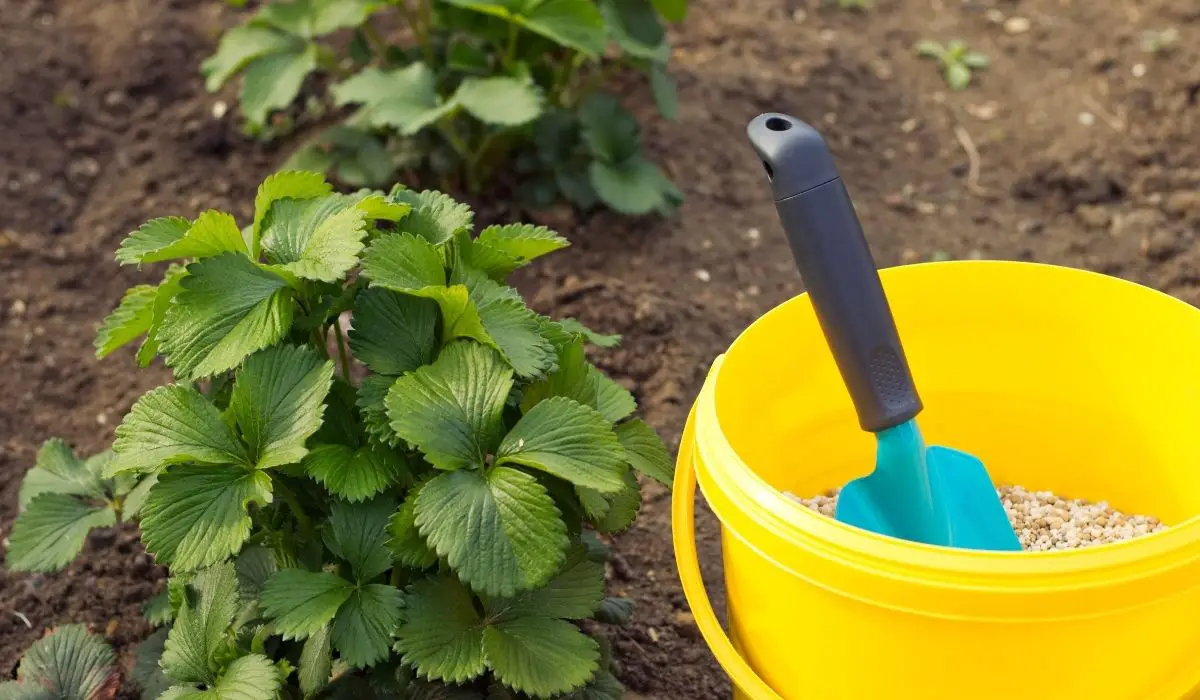Get to know the right fertilizer for strawberries to help improve your soil so your plants can give you a good crop.
Intro: Fertilizing your strawberry plants will help improve the soil where you plant them. Fertilizers can be chemical or organic (natural). It is important to know which type of fertilizer to use for strawberries and how much to use for best results.
Strawberry plants require a lot of nutrients during the growing season. Fertilizing strawberry plants every month will help give them all they need to be healthy and produce a large crop for you.
Contents
The Right Fertilizers For Strawberries
Fertilizers that can be used for strawberries include
- Chemical Fertilizer (Nitrogen, phosphorus, potassium). Chemical fertilizers are generally fast-acting and must be replenished on a regular basis. Strawberries prefer low-phosphorus fertilizer. You can burn your strawberry plants if you use fertilizer that is has nutrients in the wrong proportion. It is therefore important to find a balanced fertilizer for your strawberry plants.
- Organic Fertilizer (Manure, compost, peat moss, coffee grounds). Organic fertilizers are more long-lasting in the soil, but they release nutrients at a slower rate. Fish emulsion or manure based fertilizers are also beneficial for strawberry plants. Plant-based fertilizer can produce healthy crops over time, however they take longer to take effect.
Read more about How Deep Should A Raised Garden Bed Be
Strawberry Fertilizer Chart
The right amount of fertilizers to use for strawberry plants depends on the age and size of the plant.
Young strawberry plants need fertilizers more often than older ones since they grow faster. A lot of nitrogen will help young berry plants develop well but too much can cause them to produce leaves instead of flowers and fruit.
Fertilizing strawberry plants should be done monthly during the first year, then decrease to three or four times a year after that. Fertilizers for strawberries need to be applied at least 4-8 weeks apart from one another.
Fruit production can be affected by overfertilization as well as the lack of nutrients. If there is too much nitrogen in the soil, your strawberry plant will grow lots of leaves but no fruit because it diverts energy away from flower and fruit development. Fruiting usually stops if there is not enough fertilizer available to the plants during flowering.
Do you know fertilizing strawberries with fish emulsion will help them produce more blooms and set more fruit than plants?

When To Fertilize Strawberries
Fertilizing strawberries should start.
- When the plants are 6 inches tall – at this stage, they need a good amount of nutrients. Fertilizing strawberries should be done every 2 weeks during the first month or so, then decrease to monthly after that. Fertilizing strawberry plants this size will help them grow and produce a healthy crop for you to enjoy.
- As soon as the berries begin to grow – fertilizing strawberries when little green berries start growing on your plant is recommended because it helps increase berry production later in the season once the spring/summer growth cycle slows down.
- After fruiting stops – Fruiting usually starts slowing down as days become shorter and temperatures change, which can be around early fall. Fertilize strawberry plants at least once a month during this season to help maintain their health and vigor. Fertilizing strawberries at the end of the growing cycle will also help them produce a larger crop before fruiting stops for winter.
Fertilizing at these key times will provide strawberry plants with just the right amount of nutrients in order to grow strong and healthy. Fertilizing too early in their life may cause stunted growth, while fertilizing after fruit has set may result in fewer yields than normal.
Read more about A Guide On How To Grow Monk Fruit
What Amount Of Fertilizer For Strawberries?
It is best to use a slow-release organic fertilizer for strawberries after planting them. These types of fertilizers will give your plants nutrients throughout the season as they release into the soil.
If using chemical fertilizer, you should apply it just before you see new leaves forming on your strawberry plant. Do not mix too strong concentrations of chemical fertilizer because it could burn or kill your strawberries.
When using Fertilome Fruits and Vegetables Start-a-Mix Fruit Plant Food, which has a good balance of all essential nutrients for strawberries (NPK), it can be applied once when your strawberry plants are in their early stages. This Fertilome Fruits and Vegetables plant food should also be reapplied after fruiting ceases or when soil levels start declining in nutrients.
Learn more about The Perfect Potting Soil For Indoor Plants
Frequently Asked Questions
Do strawberries need special fertilizer?
Strawberries are heavy feeders so using fertilizer for strawberries is recommended. Fertilizer for strawberry plants is very important because it contributes to their fruit production all season long.
Nutrients contained in fertilizer help keep your strawberry plants healthy and strong, which prevents damage from potential pests or diseases. Fertilizing strawberries also encourages root growth that can help reduce transplant shock when they are moved indoors during fall or winter months.
When should you fertilize strawberries?
Fertilizing strawberries can be done at least once every two weeks during the first month or so, then decrease to monthly after that. Fertilizing strawberry plants this size will help them grow and produce a healthy crop for you to enjoy.
After fruiting stops Fruiting usually starts slowing down as days become shorter and temperatures change, which can be around early fall. Fertilize strawberry plants at least once a month during this season to help maintain their health and vigor. Fertilizing strawberries at the end of the growing cycle will also help them produce a larger crop before fruiting stops for winter.
What amounts of each nutrient in fertilizer for strawberry plant?
Nitrogen promotes sturdy stems, healthy leaves and vigorous roots; phosphorus helps produce abundant flowers; potassium results in larger berries with sweeter taste.
Every fertilizer used must have balanced nutrition and helps strawberries produce abundant while encouraging deep green foliage, which will help the fruit ripen.
Are coffee grounds good for strawberry plants?
Coffee grounds are great for tomatoes but not recommended for strawberries because they have an acidic pH level.
Which fertilizer is better to use for strawberries osmocote or miracle grow?
Both osmocote and miracle grow are great products to use on your plants, but they each have their pros and cons. Osmocote provides nutrients continuously throughout the whole growing season; however, if you do not purchase it during their early growth stages then your plants will likely need another source of nitrogen. Miracle grow can be used when planting new strawberry plants: if using chemical fertilizer though, only apply it after the first month or so of growth because nitrogen can burn or kill new plants if it is applied too early (before your strawberry plants are at least 4-6 inches tall).
Final Thoughts
Strawberries are fast-growing plants that require a good amount of nutrients to thrive. Providing them with a good fertilizer for strawberries is critical to their growth and productivity.
Provide them with the right fertilizer at high doses, and it will get stunted or die, or provide them with no fertilizer t the right time, and they will still die.
This means you have to strike a balance between the right fertilizer for strawberries and the perfect amount to use.
We hope this article addresses all your concerns about fertilizing your strawberries and enables you to reap a good crop.
Read more about A Guide On How To Customize Garden Fertilizer.
A garden is a place that relaxes us and reflects our personal style, it’s a place to spend time with loved ones and grow our own fruits and vegetables. Maybe you’re looking for design inspiration or plant selection, or you’re concerned about garden privacy, shady areas, or pests, but don’t worry, you’ve come to the right place.
